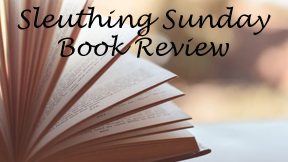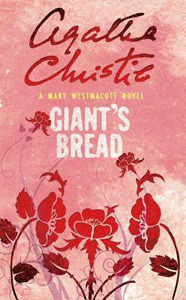In “Giants’ Bread” (1930, sometimes published as “Giant’s Bread”), her first Mary Westmacott novel, Agatha Christie seems to be as driven to write a non-genre novel as main character Vernon is to write an epic opera that will change the very medium of music.
Vernon is ultimately successful, as we learn in the prologue, but is Christie? Commercially and critically, apparently she was: A couple more Westmacotts were published before the public learned it is a pseudonym for the hit mystery author.
Dueling obsessions
Creatively, too, “Giants’ Bread” is a success. I mostly adore this mildly overstuffed tome, which comprises 231 small-print pages of the nearly 1,000-page collection of the six Westmacotts. It’s a bildungsroman about Vernon, who is obsessed with both a beautiful woman (Nell) and his operatic work (“The Giant”) – but only one at a time, to the detriment of both.

“Giants’ Bread” (1930)
Also published as: “Giant’s Bread”
Author: Agatha Christie, writing as Mary Westmacott
Genre: Romantic drama
Setting: World War I era, England
This tragically insightful story starts from Vernon’s point of view as a toddler at country estate Abbots Puissants (which will become another of his obsessions). Christie writes from a delightfully innocent child’s perspective. Vernon gradually realizes Mommydaddy are two distinct people, and is surprised to learn Nurse has a full name beyond “Nurse.”
There’s a childhood purity to his friendships with cousin Josephine (“Joe”), whom he sees as legit despite being a girl, and neighbor Sebastian, whom he realizes is cool despite being Jewish. (Beware Christie’s stereotyping here, but at least Sebastian himself comes off as an individual.)
I love the scene where Joe and Vernon wave a white flag to parley with Sebastian. He immediately agrees to be friends rather than rivals. It reminds me of the “From that moment on, Hermione became their friend” moment from “Harry Potter.”
Christie skips over their teen years – she rarely attempts to write teens – then catches up with Vernon, Joe, Sebastian and Nell (having blossomed into a hottie) in their early 20s. Here we meet the slightly older and much wiser Jane, who sees how Vernon’s unfocused life is playing out but knows her interference will do no good.
Real, but with some melodrama
From the start, “Giants’ Bread” feels different from a Christie mystery or spy-gamer, and it’s not entirely because I know there won’t be a murder or spying. It’s immediately about the people to a detailed degree even masterpieces like “Five Little Pigs” and “The Hollow” don’t strive for.
If a murder is a type of melodrama, though, it must be noted that “Giants’ Bread” has even more melodrama. Being mistakenly declared dead is less likely than murder in the real world (even in the 1920s, when record-keeping and ID papers were shoddier). Amnesia is less likely still. And having to make a split-second decision to save one of the two women you love is … well … the stuff of fiction.

That said, Christie delivers so many dead-on observations that at least four characters become utterly real (Joe gets slightly pushed to the side). The irrationality of love is the core theme. But Christie widens the scope to comment on world events. Vernon and Sebastian go off to war. Initially I thought Christie was previewing World War II, but eventually I realized “Giants’ Bread” is set during World War I – unlike most of her mystery novels, it’s not contemporary.
The immediacy isn’t sapped, though, because Christie is commenting about the ongoing political situation in what turned out to be a pause in the World War between parts I and II. This is one of her capitalism-versus-communism novels, but with a more personal bent.
These two major political approaches play in parallel to the individuals’ inner nature. Vernon’s love for Nell is pure and natural, and his operatic creation is ugly and technical; music is mathematical to him. He doesn’t understand music from the angle of beauty. It’s no accident that his writing of “The Giant” thrives once he moves to Moscow.
What’s love got to do with it?
Adding layers to “Giants’ Bread,” though, the Vernon-Nell love (as well as other romantic matches) is destructive in a macro sense. Rationally, Vernon’s music writing would proceed better without the distraction of love. Nell, meanwhile, is wired for a safe life (which she has, during the period when Vernon is presumed dead and she marries a nice, rich man).
Vernon never hates himself for his contradictions (only outside observers like Jane and Sebastian can see those clearly). But Nell hates her own guts for her desire for comfort over love (if she chooses a life with Vernon, she’ll barely be above poverty). Nell is simpler but more self-aware; Vernon is more complex but not at all self-aware.
They passionately love each other, but is that worth anything? As a hopeless romantic, I usually answer YES to this question when it’s posed in literature. But “Giants’ Bread” makes a staunch case that it’s not worth much – it might even be a net negative.
It’s a stretch to use this text to claim Christie is chiding herself for writing mystery novels (comfort) when she could be writing more Westmacotts (love). But it is safe to say that, like most successful authors, she struggled with the push-pull of creativity and career.
Fascinatingly, “Giants’ Bread” portrays love winning out, but with tragic results.
Sleuthing Sunday reviews an Agatha Christie book or adaptation. Click here to visit our Agatha Christie Zone.

